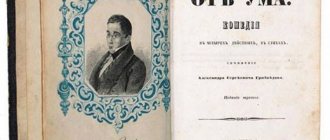- Essays
- On literature
- Griboyedov
- Image and characteristics of Sofia Famusova
In Griboedov's magnificent comedy, each hero has his own unique individual traits. Sophia is depicted as one of the controversial characters in the play. It mixes good traits with lies. By nature, the girl is endowed with intelligence and an independent character. She can care and loves with all her heart. In addition, Sophia has an excellent education and upbringing, which she received in her family. In addition to her passion for the literature of French authors, she is also fully developed. It was by reading the works of sentimental authors that our heroine learned to be dreamy and sensitive. That’s why she began to look at Molchalin, whose disposition was similar to the heroes of her novels.
Perhaps she liked this young man because she could control him as she wanted. Love for Chatsky will help us understand that these two heroes are somewhat similar to each other. And although she is only 17 years old, she feels independent. She doesn't care what others say about her. Chatsky understands this, and speaks his words to the girl, since he considers her to be his like-minded person.
Sophia, like Chatsky, experienced love disappointment, as she accidentally overheard Molchalin’s conversation with Liza. And she now sees her chosen one completely differently, since he needed her in order to advance in his career. The girl found out about it in time. After all, if this were in marriage, then she would be disappointed in love. She didn’t want Chatsky at all as a husband; it was he who revealed the whole truth to her. But, since she grew up in Famus society, she chose a person unworthy of herself.
Why did she do this? Apparently the problem was the education of all the girls of that time. She cannot at all be responsible for her every step. And all romantic heroes are not at all like real people. The girl cannot distinguish a true feeling from a fake. And we understand that, having abandoned Molchalin, she will still choose a chosen one of the same type.
Griboyedov, in my opinion, wrote a play about life, not about politics, and about the most important thing - love. Critics noted that Sophia has the prerequisites for a remarkable nature. And indeed it is. It was Sofya Pavlovna Famusova who laid the foundation for the creation of a number of images of Russian women in our literature.
Option 2
The comedy “Woe from Wit” by A. S. Griboyedov reflects the morals of the nobility of the 19th century. At the same time, the author demonstrates the confrontation between the outdated views of the serf owners and the views of the new generation of the nobility. The old generation stubbornly defends its personal comfort, while young people with progressive views strive to change society.
However, the work also contains contradictory characters whose life views do not fit into any of these positions. Such a character is the daughter of a wealthy official - Sofya Famusova.
The main character of the comedy, Alexander Chatsky, was in love with Sophia. He liked that she was not like other Moscow young ladies. However, it was precisely the love for this girl that caused the hero’s suffering, and it was because of her that he was expelled from society.
Sophia has a sharp mind, is strong and independent. Unlike other people in Famus's circle, she hates gossip and opposes public opinion. But, knowing the ways of this society, she masterfully cunning and adjusts. These character traits are surprisingly combined with her dreaminess and responsiveness.
However, the heroine has little understanding of people and the world around her; her entire worldview is formed exclusively by French novels. Thanks to these books, she formed the image of an ideal, in her opinion, life partner. Sophia found the embodiment of this abstract image in her father’s secretary, Molchalin, whom the unfortunate girl idealized. However, this love brings the heroine a lot of pain. The young girl realizes that her father will not approve of her choice, and she is not destined to be with her beloved.
Later, Sophia learns that Molchalin is not indifferent to Elizabeth. This breaks the girl's heart and forces her to renounce her lover.
The girl has a complex and contradictory relationship with the main character of the comedy. At first, Chatsky and Sophia were in love with each other, but over time everything changed. By the time the hero returned to Moscow after leaving, the girl was in love with someone else. Sophia showed cunning and cunning, wanting to take revenge on her former lover, and started a rumor about Chatsky’s madness, after which the hero was persecuted.
Sophia is one of the smartest and most sensible characters in the work. She is pure and dreams of true love, but there is no worthy person next to her. She is smart and very well read, but very far from real life. Because of this, the girl does not always behave with dignity and makes many mistakes.
The heroine is very unhappy and suffers more than other characters, even more than Chatsky. Because of her contradictory character and difficult fate, the heroine evokes both pity and sympathy in readers.
Several interesting essays
- Essay Sunday is my favorite day of the week
- System of images in the work The Tale of Igor's Campaign
This magnificent work can be called both historical and folk, because it simultaneously contains elemental parts of these directions. - Essay reasoning Unrequited love 11th grade
Throughout life, every person is faced with such a very difficult feeling as unrequited love. The worst thing, of course, is to encounter this for the first time, coupled with first love. Special tragedy - Essay on the topic Winter day
I really like winter, it is full of mystery and a certain charm. One winter morning I wanted to go into the forest. I love being there in winter, it attracts with its beauty - Landscape and its role in Turgenev’s story Bezhin Meadow 6th grade essay description of nature
Turgenev’s stories are always full of colorful descriptions of nature, especially in the “Notes of a Hunter” series. The author skillfully paints landscapes in the smallest detail. When you read the works of Ivan Sergeevich, you are completely immersed in the atmosphere
Essay about Sophia
A.S. Griboyedov is known as a brilliant diplomat, publicist and playwright. His comedy “Woe from Wit” truly gained immortality. The images that the author gave us can still be found today. As before, the Famusovs and Skalozubs live according to the principle of “the past century.” The ladies Khlestovs and Khryumins are still rude, ill-mannered and believe that their opinion is solely correct. The Chatskys are considered crazy and outcasts. And “Silent people are blissful in the world”, this is a very tenacious type.
Well, what about Sophia? Famusov's daughter is the most vague, at first glance, image, as if the author did not consider it necessary to write it down. But that's not true. The brightest, most colorful characters in classical works always have “speaking” surnames. They immediately make it clear to the reader who we are dealing with, what type of people they are. “Woe from Wit” is no exception here. Sophia is the daughter of the main character and bears her father's surname. But her name may tell us something. Translated from Greek, it means “wise.”
Her characterization is contradictory. The girl received a good education, at least that’s what her father thinks. She lost her mother early and her father “managed to recruit a second mother to Madame Rosier.” He himself paid little attention to the child. And the girl grew up reading French novels. Therefore, she easily falls in love with Molchalin, in whom she sees the ideal of a romantic hero, attributing virtues to him. His modesty, taciturnity, and lack of wrangling are interpreted by the heroine in her own way, considering them advantages. She is loyal and stubborn. He sincerely fights for the honor of his beloved, defending him before Chatsky and his father. He is not afraid to speak out against secular society, defending his love.
Sophia is a kind of bridge between Chatsky’s world and “Famusov’s Moscow.” For some time she rushes between two worlds. And there is hope that all is not lost for her. Her father's society is made up of mercantile people who protect their interests and personal comfort. They are ready to crawl and curry favor for the sake of obtaining personal benefits. Molchalin is also ready to do anything to achieve “known degrees.” Sophia is not like that. She believes in ideals, love, loyalty, honesty. The girl openly expresses her thoughts and feelings. She is characterized by determination and courage. But, ultimately, the influence of environment and upbringing takes its toll. In addition, she is very offended by Chatsky’s attitude towards her lover. After all, this is her choice, it cannot be bad. In the end, she understands that Molchalin is low and mean. But the resentment towards Chatsky remains. The heroine takes revenge on Chatsky in an ugly and petty, but very feminine way. Sophia declares him crazy.
Sophia is, of course, an extraordinary person: passionate, deep, selfless. She partly has the features of the “Famus” environment. There are some similarities with Chatsky, so he came to Moscow because of his love for her. On the other hand, she lives the way that suits her. And when she needs to take revenge on Chatsky, she ideally adapts to her father’s company.
Sentimental Novels and Women's Education
The image of Sophia in the comedy “Woe from Wit” is not only dramatic, but also in some way collective. Using her example, Griboedov shows the tragedy of girls from secular society. After all, what is the reason that she not only fell in love with a scoundrel, but also slandered Chatsky, who loves her? The author gives a direct answer to this question: “teach our daughters everything... and dancing, and sighing, and singing! It’s as if we are preparing them as wives for buffoons.”
That is, it says here that the girls, although they knew a lot and were trained, were preparing for only one thing - a successful marriage. And Sophia, like many, builds her life according to the generally accepted model.
On the other hand, she was also raised by books—French novels that keep her awake. The characterization of Sophia (“Woe from Wit”) gives us the opportunity to assume that Griboedov was trying to raise the problem of enlightenment and women’s education in Russia of his time.
Even the choice of Molchalin as a subject of admiration was largely due to sentimental novels that described the love of a noble girl and a poor young man (or vice versa). Sophia admired the courage and devotion of the novel's heroes. And she believed Molchalin to be the same book character.
The girl cannot separate reality from fiction, which is why her love ends so sadly.
Essay 4
A.S. Griboyedov was a man who did a lot for his Motherland. He entered literature as the creator of the greatest comedy “Woe from Wit.”
An important place in it is occupied by the depiction of the vices of the contemporary society of the writer. The problems that the author raises in his work concern the Russian public many years after the comedy was published. “Woe from Wit” is Griboyedov’s highly patriotic reflections on the fate of Russia, on the possibilities of reformation and transformation of its life. In this regard, important state-legal, spiritual and general cultural problems of the era are raised in comedy. The comedy “Woe from Wit” by Alexander Sergeevich Griboyedov tells the story of the conflict between a man of advanced judgment - Alexander Chatsky - and the musty Famus society. Exclusively one character was originally conceived as the closest in spirit to Chatsky - this is one of the most interesting heroines - Sofya Pavlovna Famusova.
It is worth noting that the play by A.S. Griboedov is a realistic work, the characters of the heroes are not clearly defined: there is no clear stratification of the heroes into “bad” and “good”. Thus, Sofya Famusova occupies an intermediate position in the play. She is a very contradictory and ambiguous heroine. In a way, it is marked by internal characteristics inherent in an adult, but on the other hand, by infantilism. The girl wants sincere love and deep, real feelings. she is surrounded by petty and nasty people. It is difficult for her to resist the pressure society puts on her. The girl intends to be happy, but no one is able to advise her on anything to achieve her goal. Therefore, Sophia is forced to do the wrong thing, making mistakes and immediately correct them. Sophia, like Chatsky, is an ardent person, living with a strong and genuine feeling. In conclusion, I would like to say that in the work “Woe from Wit” Sophia is undoubtedly different from the society that surrounds her.
The girl in many of her judgments differs from her father, and most importantly, from the entire secular society of nobles. She is not afraid to defend her love, and to oppose the society of mercantile and unscrupulous nobles, she is a strong personality who will not miss her goal.
The tragedy of Sofia Famusova
In the comedy "Woe from Wit" Sophia is the most tragic character. She suffers more than even Chatsky.
Firstly, Sophia, having by nature determination, courage, and intelligence, is forced to be a hostage of the society in which she was born. The heroine cannot allow herself to give in to her feelings, regardless of the opinions of others. She was raised among the conservative nobility and will live according to the laws dictated by them.
Secondly, Chatsky’s appearance threatens her personal happiness with Molchalin. After Chatsky’s arrival, the heroine is in constant tension and is forced to protect her lover from the caustic attacks of the protagonist. It is the desire to save her love, to protect Molchalin from ridicule that pushes Sophia to spread gossip about Chatsky’s madness: “Ah, Chatsky! You like to dress everyone up as jesters, would you like to try it on yourself?” However, Sophia was capable of such an act only because of the strong influence of the society in which she lives and with which she gradually merges.
Thirdly, in the comedy there is a cruel destruction of the image of Molchalin that has formed in Sophia’s head when she hears his conversation with the maid Liza. Her main tragedy is that she fell in love with a scoundrel who played the role of her lover only because it could be beneficial for him to receive the next rank or award. In addition, Molchalin's exposure occurs in the presence of Chatsky, which further wounds Sophia as a woman.
Characteristics of Sophia (Woe from Wit)
Each character in Griboyedov's comedy "Woe from Wit" has its own unique qualities. Here there is a confrontation between the views of the serf owners, which are already outdated, and the views of the new generation of the nobility. The generation of serf owners is fighting for their comfort in life, while the nobles want to completely change society. Sofya Famusova has both positive and negative qualities. If we immediately talk about a negative trait, then this is a lie. But she is distinguished by her intelligence and independent character. She is a very sincere person.
The heroine takes all her experiences to heart. Accordingly, she loves sincerely, from the heart. As a child, she was given an excellent education and raised well. Sophia is interested in French literature. Thanks to this, she became a dreamy and sensual person. She imagines her future husband as someone she read about in novels, and this is very different from real life. She really hates various gossip and fearlessly opposes the generally accepted opinion in society. Molchalin’s character was very similar to the heroes of her favorite novels. That's what she liked about him. Besides, she controlled it the way she wanted. Chatsky is somewhat similar to Molchalin. Sophia is only seventeen years old, but she already feels like an adult and independent girl. And she absolutely doesn’t care what others think or even say about her.
After Sophia accidentally overheard Molchalin’s conversation with Lisa, she was deeply disappointed. Now she realized that she needed her chosen one only in order to advance in his career, and also that he liked Elizabeth. But it’s good that this happened now, before they got married. But as they say, whatever is not done, everything is for the better. Sophia chose a husband who was unworthy of her. Besides, she didn’t really want to marry him. So events developed only for her benefit.
The question arises, why was she going to marry a man she barely loved? The upbringing of that time played a big role. The girl often could not be responsible for her every step. Having ended her relationship with Molchalin, she again chooses a young man with a similar character. Unfortunately, she does not know how to distinguish sincere love from fake feelings. As a result, she makes many mistakes and suffers the most.
The play “Woe from Wit” is a play about life, about love. It is interesting that it was Sofya Famusova who began the creation of the image of a woman in many works of Russian literature.




